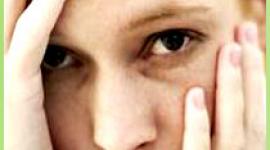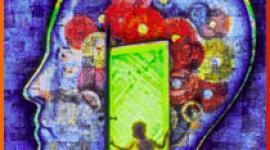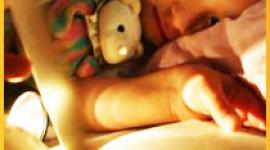Anxiety: The Other Disorder
While depression in older adults is the mental health problem most often discussed, anxiety is the most common disorder they actually face.
In older adults, anxiety is twice as likely to strike as depression
 Sometimes James Coats would wake his family in the darkness of a quiet night because he was sure he was about to die. His chest hurt, he felt dizzy, and he had an overwhelming sense of doom."I'd haul my wife and children off to the emergency room at two or three in the morning, because I thought I was having a heart attack," says Coats, 56, a semi-retired construction contractor who lives near Raleigh, N.C. "I'd find out it wasn't a heart attack, but it sure felt like one."
Sometimes James Coats would wake his family in the darkness of a quiet night because he was sure he was about to die. His chest hurt, he felt dizzy, and he had an overwhelming sense of doom."I'd haul my wife and children off to the emergency room at two or three in the morning, because I thought I was having a heart attack," says Coats, 56, a semi-retired construction contractor who lives near Raleigh, N.C. "I'd find out it wasn't a heart attack, but it sure felt like one."
Coats had other unexplained symptoms. His heart rate and respiration would suddenly increase. He would begin to perspire excessively, and tremble. But most of the time he would be filled with a pervasive anxiety that left him incapable of doing such simple things as leaving the house.
It took nine years for Coats to find out that he has an anxiety disorder, and only after the proper diagnosis did he get the help he needed.
The Other Mental Health Problem
While depression in older adults is the mental health problem most often discussed, it is not the most common one faced by older adults -- a fact publicized in a new government report, Mental Health: A Report of the Surgeon General, released in December 1999.
Anxiety disorders, like the kind experienced by Coats, are the most common form of mental illness among adults, including those age 55 and older, according to the report. These conditions -- such as panic attacks, phobias, and obsessive-compulsive disorder -- are "important but understudied conditions in older adults," according to the report.
People age 55 and older are more than twice as likely to suffer from anxiety as depression. According to estimates in the report, during any one year, about 11.4 % of adults age 55 and older have anxiety, compared to 4.4% who have a mood disorder such as depression.
The 458-page report - the first-ever on mental illness from the U.S. Surgeon General - incorporates reams of recent research from all age groups. Like past reports on such health issues as smoking, this one tries to enlighten the public about a health problem so they can "confront the attitudes, fear, and misunderstanding that remain as barriers [to treatment] before us," Surgeon General David Satcher, M.D., Ph.D., writes in the preface.
R. Reid Wilson, Ph.D., who treated James Coats, is a psychologist at the University of North Carolina, Chapel Hill, and also has a private practice. "Anxiety disorders in the older population appear to be an unrecognized and unaddressed problem," he says.
Defining the Problem
The umbrella term "anxiety disorder" is used to describe a range of mental health problems, including:
- Phobias, such as fear of flying, heights, or public places
- Panic disorder, or the sudden feeling of impending doom
- Obsessive-compulsive disorder, in which people experience senseless or distressing thoughts that lead them to repeat actions, like hand washing multiple times in rapid succession
- Generalized anxiety disorder, often described as "a constant state of worry"
Occasional feelings of anxiety are a normal part of life, but anxiety disorders cause people "to become preoccupied with their thoughts to such an extent that it disrupts their everyday lives and drains their mental energy," says Wilson.
Like Coats, many older adults suffer for years without knowing what is wrong with them, Wilson says. Only a third of those afflicted seek treatment. Some may feel stigmatized; others may not be aware that the symptoms they are experiencing are part of a treatable mental health condition. According to the Surgeon General's report, anxiety disorders usually first appear when people are younger, but the stress of aging -- deteriorating health, bereavement over the loss of a spouse -- can cause their reappearance in later years.
Help Is at Hand
Today, more is known about treatment for anxiety, and according to mental health experts and research studies, the success rate is usually high, with obsessive compulsive disorder often the only exception. Individual counseling and group therapy can help people understand their anxiety disorder and situations that can trigger it. They can also learn coping methods, such as relaxation techniques. While medications like benzodiazepines have been tried, according to the Surgeon General's report, such drugs are more effective for episodes of acute anxiety in older adults than for the treatment of chronic, or ongoing, anxiety.
After two years of group therapy, Coats learned how to use such techniques as exercise, self-help groups, and relaxation tapes to help him cope with his anxiety. "I'd say I was plagued by it for 16 years,'' he says. "I used to keep it all to myself and not talk about it. But now I find the more I talk about it and face my anxiety, the better I feel."
next: Body Dysmorphic Disorder
~ anxiety-panic library articles
~ all anxiety disorders articles
APA Reference
Gluck, S.
(2007, February 18). Anxiety: The Other Disorder, HealthyPlace. Retrieved
on 2026, February 28 from https://www.healthyplace.com/anxiety-panic/articles/anxiety-the-other-disorder


